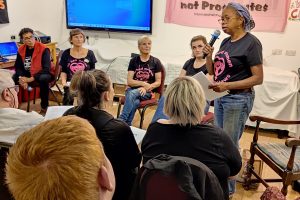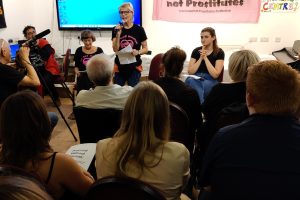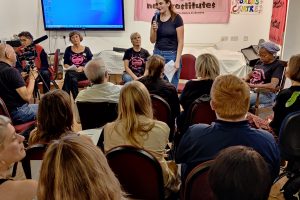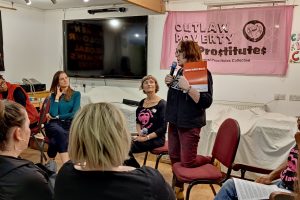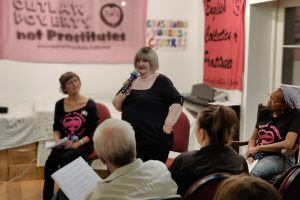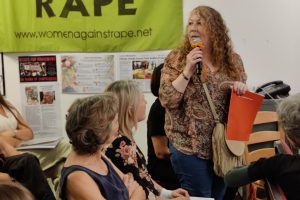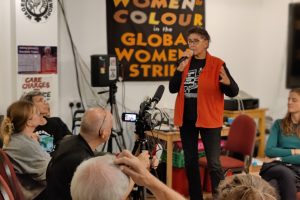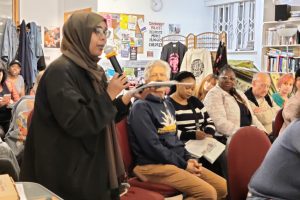Proceed Without Caution – launch of new report
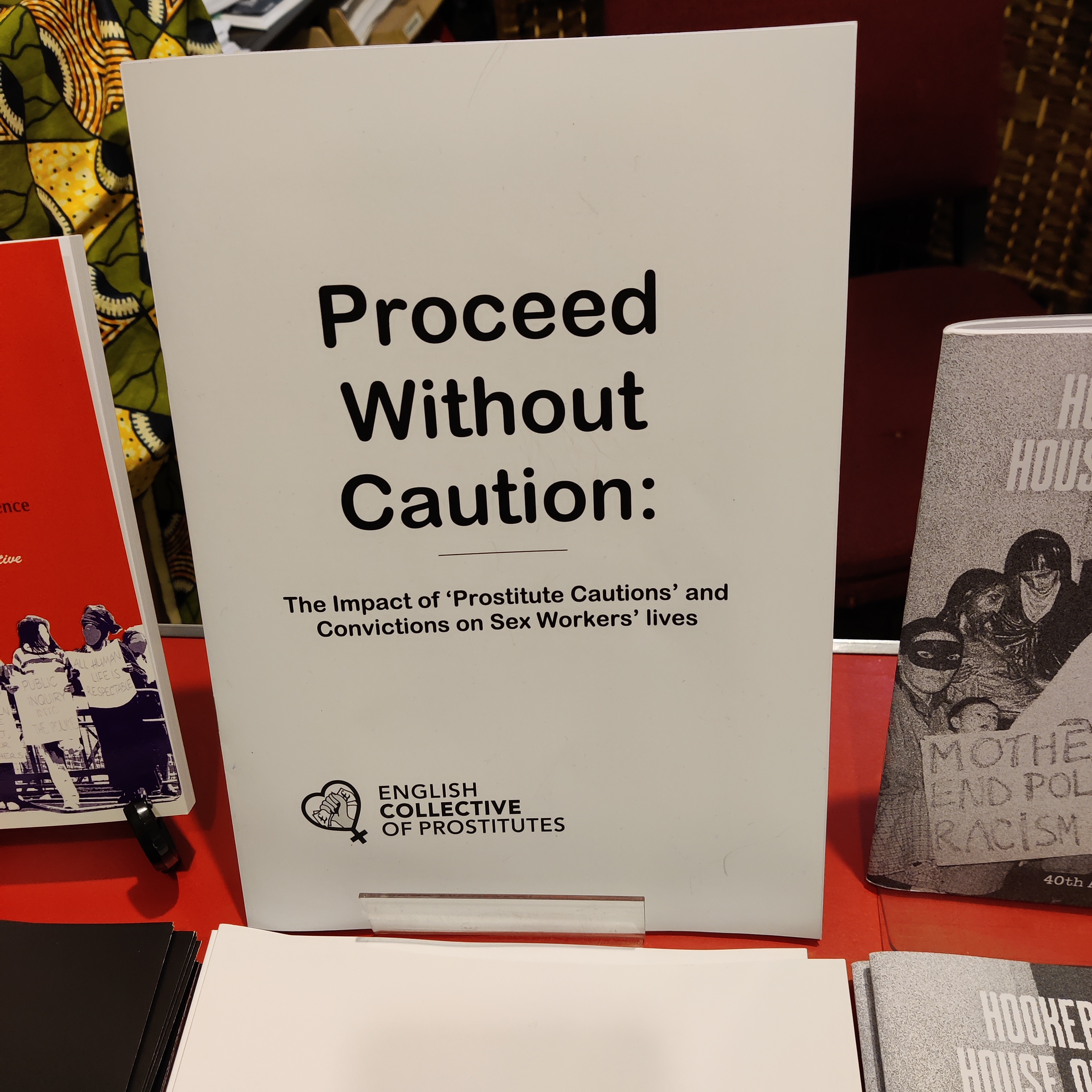
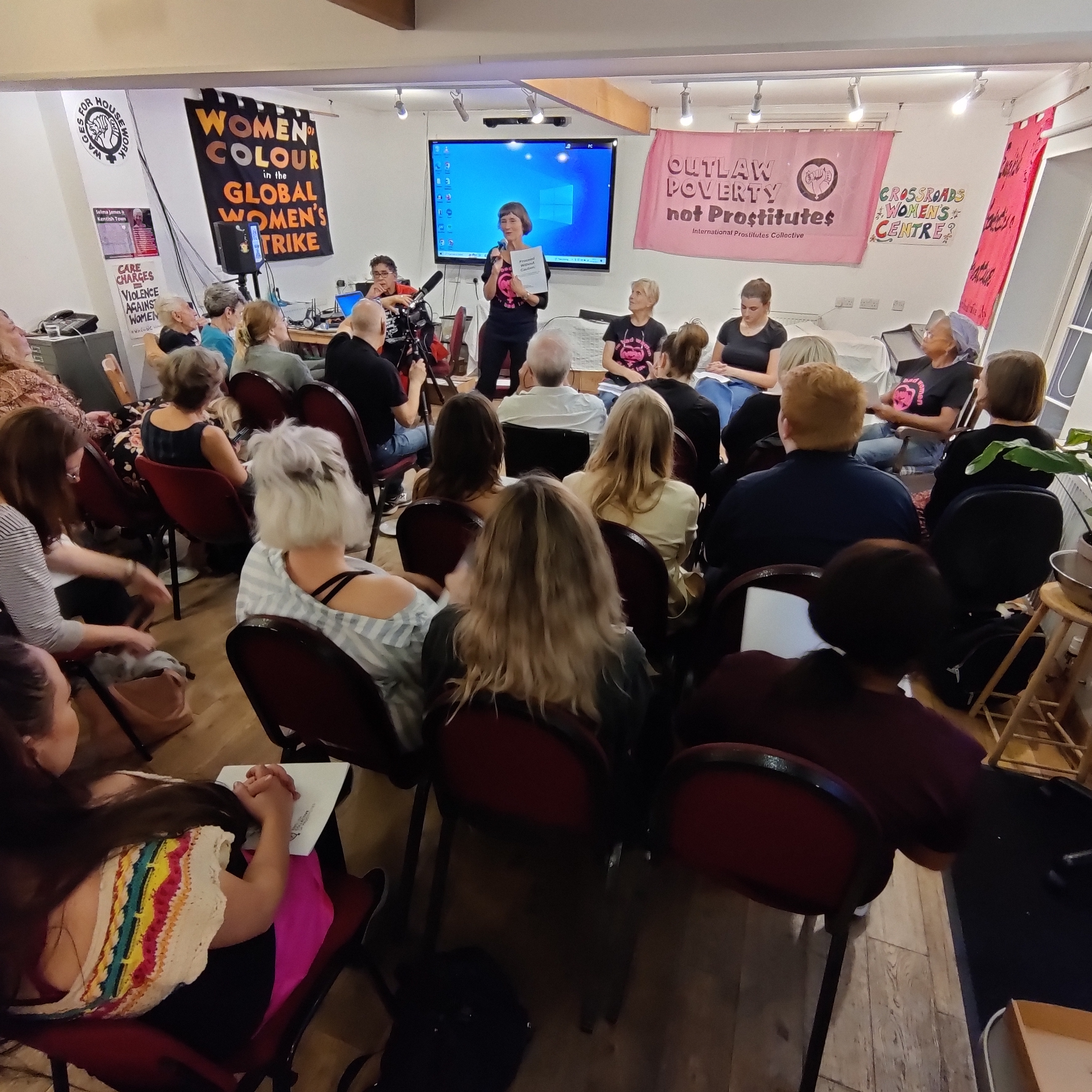
DOWNLOAD REPORT HERE
On the 11th of October 2023, the English Collective of Prostitutes (ECP) launched their report “Proceed Without Caution: The Impact of Prostitute Cautions and Convictions on Sex Workers’ lives”.
Twelve sex workers, four of whom are women of colour, were interviewed for the report and describe the lifelong and devastating impact of having a “prostitute caution” or conviction for prostitution offences on their record. They speak in distressing detail about how it trapped them in prostitution preventing them getting other work, denied them access to education, housing and justice as victims of violence and affected their relationships with their family and friends.
At the launch, Cari (ECP) introduced the report saying it was community research done by sex workers themselves, who interviewed their workmates and friends. She started by explaining that sex workers are working for the money and that rising poverty had increased the numbers of women, and especially mothers, going into sex work.
Cari outlined the prostitution laws and explained the difference between a “prostitute caution” and a police/criminal caution:
‘Prostitute cautions’ differ from police cautions in that the woman doesn’t have to admit guilt, there is no appeal and it stays on your record for life (or until you are 100).
Karoline (ECP) gave an overview of the key findings of the report such as: two-thirds of the women interviewed said a ‘prostitute caution’ or conviction had been the reason they found it hard to leave sex work. Almost all said that having a record deterred them from reporting crimes and violence and described horrific and discriminatory experiences with police, lawyers and even doctors. Heartbreakingly, two-thirds of women also said that having cautions or convictions on their record had a negative impact on their relationships with friends and family. Karoline concluded that:
I really cannot do justice to all the stories that we heard doing this research. It is so important to hear from the women themselves in their own words, so please do read the full report with the quotes which are at the core of why this work is so important.
Alice Hardy, a lawyer at Bindmans solicitors, who is working with the ECP, gave the legal background of ‘prostitute cautions’, and some insight about how to fight to get them expunged.
Testimony from three women included a woman of colour who described how she was abused in institutionalised care when she was a child and, when later in life she went for compensation for this abuse, her award was reduced by a half because she had cautions and convictions on her record.
An immigrant woman spoke about the constant threat of deportation she felt looming over her because of being under investigation and how it had made her less able to care for her child.
Laura (ECP) concluded the panel by laying out how the same police force that has been exposed as institutionally misogynist, racist, violent and corrupt, was the one handing out cautions on a whim, without evidence. She added that:
The criminalisation imposed on sex workers by the prostitution laws is part of the criminalisation of survival affecting many sectors of people – working class, of colour, immigrant, young, protesters, including climate activists, among others. It is therefore imperative that we come together across these divides to organise and defeat this.
Contributions from the audience came from people from many towns and cities including Birmingham, Bristol, Hull and Nottingham.
A woman from a new coalition called Safety First Wales described their work campaigning for decriminalisation and resources for sex workers in Wales. The Kinship Care Alliance in Scotland explained that some mothers who used to resort to minor offences like petty theft to take care of their children, had to resort to prostitution during the pandemic. She had seen how women and girls were being recycled through the care system, and that even if there was never a conviction, a caution would show up on your record and trap women in poverty. Becky Lacey, a key organiser from Ireland, described the impact of the stigma attached to sex work and how a law introduced in the last few years to criminalise clients had put sex workers at greater risk of violence.
The Sex Workers Union pointed out that there was an appetite among sex workers to organise to improve their own working conditions, and that ‘charities and services’ that imposed themselves weren’t needed. She also said that so-called police “welfare checks” were nothing of the sort as in her experience they consisted of eight officers turning up at her place of work and questioning women working there causing fear and distress.
Several women pointed to the commonalities between sex workers’ struggles and the struggle for the right to abortion – both of which revolved round the right of women to have control of their own body.
There was also a lively discussion about the mandatory reporting/safeguarding referrals that the coalition Support not Separation said they had seen to be increasing. This is affecting mothers, including sex working mums, who end up having their children taken from them. One audience member pointed out that this also often happened to women who were accessing help from local pharmacies in order to fight addiction.
What was made clear throughout, was that the issue of ‘prostitute cautions’ and convictions was really a class struggle. Cautions and convictions were a mechanism to discriminate against and control working class women from a broad range of backgrounds, and the bosses, police and people in power were being helped by women who call themselves feminists and charities advocating for rescuing women, instead of fighting criminalisation, exploitation and poverty.
Overall, the launch was an important moment to discuss a wide range of struggles and experiences, and how the demands of sex workers fitted into that context.
People were resolved in demanding and fighting for the expunging of records and full decriminalisation, so as to ensure no one is criminalised and trapped in poverty for simply trying to survive and care for themselves and others.

